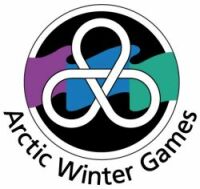History
The Arctic Winter Games were founded in 1969 under the leadership of Alaska Governor Walter J. Hickel, Stuart (Stu) M. Hodgson, Commissioner of the Northwest Territories, and James Smith, Commissioner of Yukon. The idea to "provide a forum where athletes from the circumpolar North could compete on their own terms, on their own turf" came from Cal Miller, an advisor with the Yukon team at the 1967 Canada Winter Games.
In 1970 in Yellowknife, Canada, 500 athletes, trainers and officials came together for the first Arctic Winter Games. The participants came from the Northwest Territories, Yukon, and Alaska. Participants now come from Alaska, Northern Alberta, Yukon, Nunavut, Nunavik, Northwest Territories, Greenland, Finland and Norway. The games in 2002 were the first jointly hosted Arctic Winter Games, by Nuuk, Greenland, and Iqaluit, Nunavut. During the 2023 games, Prince William held a video conference with nine participants. [2]
Designed to celebrate the unique sports and cultural heritage of the Arctic, the Games showcases a diverse range of competitions, traditional sports, and cultural events. With a strong emphasis on fostering friendship, cultural exchange, and athletic excellence, the Arctic Winter Games has become a platform for showcasing the talents and traditions of northern communities.
The next Arctic Winter Games are scheduled to take place in Whitehorse, Yukon from 8–15 March 2026. [3]
This page is based on this
Wikipedia article Text is available under the
CC BY-SA 4.0 license; additional terms may apply.
Images, videos and audio are available under their respective licenses.



